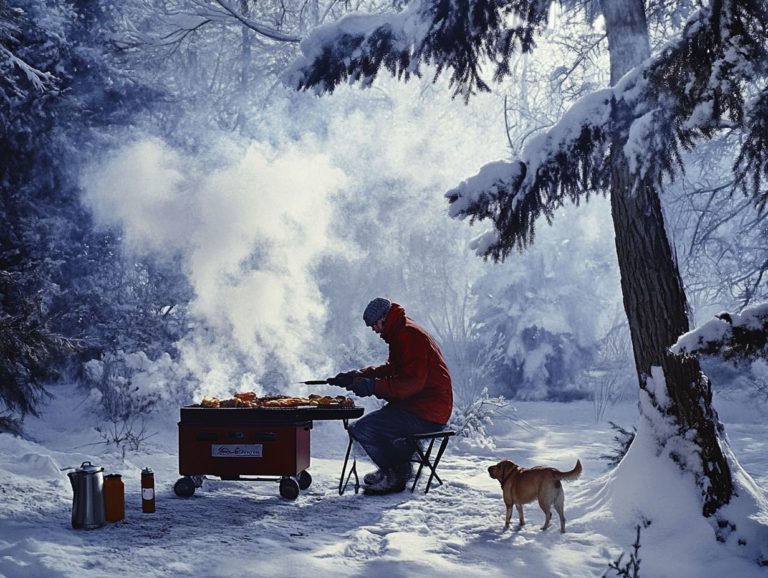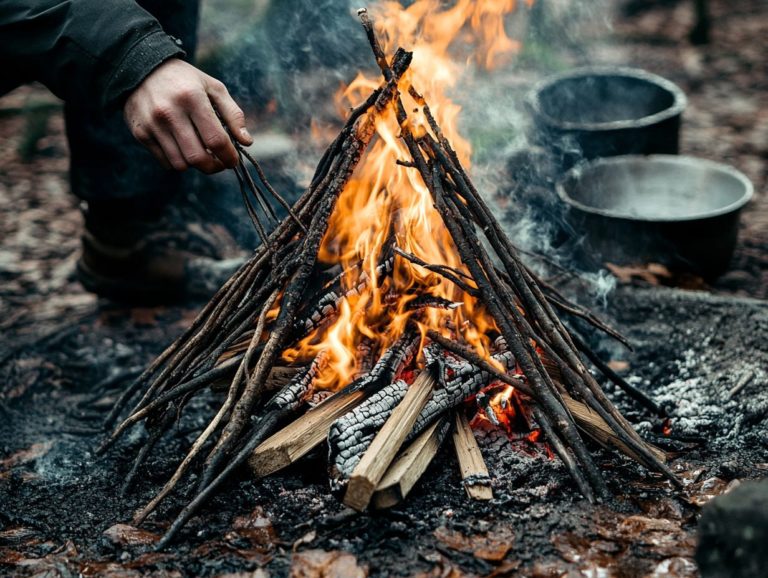What Are the Best Tools for Cooking on the Beach?
Beach cooking combines the relaxation of a day at the beach with the pleasure of preparing and sharing meals. It’s an ideal way to enjoy time with family and friends.
It also has challenges, such as sourcing the right equipment like grills and coolers, and selecting food that stays fresh in the heat. Proper planning is essential.
This article outlines the essential tools needed for cooking on the beach, offers tips for successful beach cooking, and presents a selection of delicious recipes that cater to a variety of tastes.
Contents
- Key Takeaways:
- Essential Tools for Beach Cooking
- Tips for Successful Beach Cooking
- Beach-Friendly Recipes
- Frequently Asked Questions
- What Are the Best Tools for Cooking on the Beach?
- What type of portable grill should I use for cooking on the beach?
- Do I need to bring my own cooking utensils for beach cooking?
- Can I use regular kitchen utensils for cooking on the beach?
- What should I bring for storing and transporting food to the beach?
- Are there any other tools or equipment I should consider for beach cooking?
Key Takeaways:
- Bring a portable grill or stove to cook on the beach. This opens up a world of delicious meal possibilities!
- Choose lightweight and durable cookware and utensils for beach cooking. These will be easier to transport and withstand the outdoor elements.
- Stay safe and keep your food fresh to enjoy the ultimate beach feast using coolers and ice packs, and a campfire grill for added cooking versatility.
Benefits and Challenges of Cooking on the Beach
Cooking on the beach is an exciting adventure with amazing benefits and a few challenges to conquer! The advantages include a serene setting, fresh air, and the chance to enjoy delicious campfire meals with loved ones. However, challenges such as managing beach sand and unpredictable weather, along with the need for proper campfire construction and setup, must be addressed.
For those cooking while camping, such as backpacking or canoe camping, being aware of these factors can help ensure memorable meals in the beautiful coastal environment. Using fresh, locally sourced ingredients maximizes the quality of every dish and enhances the enjoyment of preparing meals by the sea.
Socializing around the campfire fosters interpersonal bonds and creates cherished memories that are often reminisced about for years to come.
Despite the need for adjustments—like sudden gusts of wind and grains of sand that may touch the food—thoughtful techniques in building the fire and protecting the food can help mitigate these issues. Limited cooking equipment may require creativity, but with proper planning, it is still possible to achieve wonderful meals.
Safety while cooking on the beach is paramount. It is essential to leave campsites and campgrounds cleaner than found, ensuring that fire pits, which can be creatively integrated into the cooking process, are properly tended.
Several factors influence cooking on the beach, each with its own set of advantages and disadvantages. Here are some examples to consider:
- Weather Environment:
- Pros: Beach weather is typically warmer and sunnier, allowing for more pleasant outdoor cooking conditions. A cool breeze can enhance the cooking atmosphere.
- Cons: Weather can change rapidly, and strong winds may complicate maintaining fires or operating cooking appliances.
- Personal Factors:
- Pros: People often feel more relaxed at the beach, making cooking more enjoyable compared to cooking at home.
- Cons: This relaxed mood can sometimes lead to forgetting essential steps in the cooking process.
- Equipment Factors:
- Pros: There are usually plenty of cooking options available, such as using a barbecue grill or a portable campfire.
- Cons: The quality of beach cooking equipment may be less than ideal, and improvisation may be necessary.
- Food Safety:
- Pros: The beach atmosphere can facilitate good food safety practices.
- Cons: Care must be taken to ensure that proper food safety measures are consistently followed.
- Sand and Salt:
- Pros: Ingredients like sand and salt can enhance the flavor of dishes when cooking on the beach.
- Cons: Sand and salt must be rinsed off cooking equipment and dishes after use to prevent unwanted residue.
- Cooking Techniques:
- Pros: Camping chefs can experiment with various outdoor cooking techniques not typically available at home.
- Cons: The quality of cooking equipment may not match that of a fully equipped kitchen.
Cooking on the beach is a rewarding adventure! With the right campfire setup and a little preparation, you can create amazing meals while enjoying the great outdoors.
Essential Tools for Beach Cooking
The equipment and tools essential for beach cooking include the campfire cooking gear necessary for successful outdoor meal preparation. This includes portable grilling equipment and beach campfire cookware like cast iron skillets and various campfire utensils.
Having reliable beach cooking equipment is crucial for preparing meals outdoors efficiently and safely.
Grills and Stoves
Grills and stoves are vital for preparing meals at the beach. They generate heat for grilling meat, fish, or vegetables, or for cooking in a single pot. Typically, they are fueled by gas, charcoal, wood, or wood pellets and are easy to transport.
Grills and stoves must be efficient yet sturdy to withstand sandy environments and salty ocean air. Compact gas grills are lightweight and popular for their ease of setup, providing reliable heat, making them ideal for searing fish or frying burgers. On the other hand, charcoal grills add a smoky flavor that enhances the outdoor cooking experience, despite requiring more preparation and cleanup.
Wind protection keeps the flame steady for both grills and stoves. Safety is also essential, as open flames should be kept away from flammable materials. Quality cooking gear maximizes the beach cooking experience and allows for creative techniques, like steaming seafood in a perforated pot or roasting marshmallows over a low flame.
Using various cooking methods, including cooking over fire and using a Dutch oven—a heavy pot designed for cooking over fire—will elevate the enjoyment of a day at the beach.
Cookware and Utensils
Cookware and utensils are key for effective meal preparation while cooking at the beach. Items such as a cast iron skillet and a Dutch oven, along with essential campfire utensils like tongs and long wooden spoons, facilitate various cooking methods.
These tools provide versatility in culinary techniques and enhance the flavors of meals prepared by the shore.
Keep your tools in top shape by cleaning them thoroughly after each beach adventure to remove sand and salt that can corrode them. A portable grill for open flame cooking is a valuable addition, allowing you to impart the smoky flavor characteristic of beachside barbecues.
Store utensils in protective cases and keep them out of harsh elements when not in use to ensure they remain in good condition. Following these guidelines helps ensure lasting performance and enjoyment during your beach cooking adventures.
Coolers and Ice Packs
Coolers and ice packs are essential for keeping food safe and fresh during your beach cooking adventures. On sunny beach days, keeping your food safe is a must! A well-packed cooler with ice packs ensures that perishable foods stay at safe temperatures.
There are various types of coolers available, including hard-sided coolers, which are durable and well-insulated, and soft-sided coolers, which are lighter and easier to carry. The best cooler for your needs depends on your travel distance and how long you need to keep the food cold.
Properly packing the cooler is just as important as the cooler itself. Place the heaviest items at the bottom, followed by ice packs, with lighter and frequently accessed items on top. Using ice packs instead of ice cubes saves space and maintains a dry environment, crucial for preserving food quality.
During beach outings, regularly check the temperatures of perishable foods to ensure they remain chilled and watch for signs of spoilage. Since outdoor cooking often involves campfires, practicing campfire safety while ensuring food freshness is vital for a successful day at the beach.
Tips for Successful Beach Cooking
Successful beach cooking requires careful planning, execution, and a focus on safety and food quality in beautiful surroundings.
Select the right location for campfire cooking, along with thoughtful meal planning and preparation. These are essential for creating delicious meals while ensuring food safety.
Choosing the Right Location
Select the right spot for your campfire setup. This is essential for a successful beach cooking experience.
Consider factors like wind direction, how close you are to water, and local safety regulations.
Avoid areas with dry vegetation that could easily catch fire. Many beaches have specific guidelines for campfires, including using portable fire pits or avoiding open flames.
Following these guidelines is crucial for safety and environmental preservation. Familiarize yourself with local regulations concerning campfire safety, including allowable distances from other campers, wildlife considerations, and fire extinguishing techniques.
This not only ensures compliance but also gives you peace of mind while enjoying your outdoor culinary adventure.
Meal Planning and Preparation
Meal planning and preparation are key for a successful beach cooking experience. They help ensure enjoyable times with delicious food.
Opting for one-pot meals is a smart strategy. It reduces the number of dishes to clean while providing wholesome meal options, especially for campfire cooking.
Thoughtful consideration of the food types and preparation methods can transform your beach experience. Fresh vegetables, seafood, and grains—preferably pre-cooked—are excellent options.
Quick recipes, like foil shrimp and veggie packs seasoned with herbs, or one-pot pasta cooked over a campfire grill, can be made with minimal effort. Marinated chicken skewers can be prepared at home before your trip, allowing your family to enjoy simple meals in the sun.
Keeping Food Safe and Fresh
Food safety and freshness are crucial for beach cooking, especially in hot weather. Using coolers, ice packs, and heat-proof gloves will keep your food fresh and tasty!
Proper packing is essential for maintaining food safety during outdoor trips. Use airtight containers to prevent contamination and spoilage.
Regularly check food temperatures with a food thermometer, particularly for meat and dairy, which can spoil quickly. When using campfire cookware, ensure everything is stored securely.
Hygiene is vital for food safety as well. Wash your hands frequently and designate a specific area for food preparation. Following safe campfire cooking methods—like building a controlled fire and cooking food thoroughly—will contribute to enjoyable beach outings.
Beach-Friendly Recipes
Beach-friendly recipes can enhance your outdoor cooking experience, turning even the simplest meals into delightful culinary adventures.
These easy-to-prepare recipes feature nutritious one-pot meals, grilled veggies, and specialty drinks, making them perfect for a day at the beach.
Simple and Delicious Dishes
Simple and delicious dishes are at the heart of beach cooking. They offer ease of preparation and great flavor.
Meals that require only a few ingredients and can be made in one pot—using a cast iron skillet—are ideal for outdoor cooking. This allows more time to enjoy the beach.
Quick-to-make dishes can transform an ordinary beach day into an extraordinary culinary experience. Equip yourself with a barbecue grill to elevate the flavors.
A quick shrimp and vegetable stir-fry with lemon and garlic or a simple pasta dish with fresh vegetables can be prepared in a single pot. Using a Dutch oven makes cleanup easy while highlighting the fresh tastes of summer.
Bring your friends and family together to enjoy outdoor dining in style!
Vegetarian and Vegan Options
Vegetarian and vegan options are essential for creating inclusive beach cooking experiences, offering delicious and nutritious meals for everyone.
Using fresh ingredients like grilled vegetables and plant-based proteins allows for the preparation of satisfying dishes that are easy to make over a campfire setup.
When planning outdoor meals, consider vibrant salads filled with local produce or smoky wraps packed with legumes and grains. Using campfire gear can make the preparation more enjoyable.
Simple techniques, such as skewering marinated tofu or creating vegetable kebabs, can add both flavor and fun to the grilling process. Using campfire equipment enhances these beach dishes, promising an unforgettable culinary experience under the sun.
Specialty Drinks and Desserts
Specialty drinks and desserts add a delightful dimension to beach cooking, offering refreshing options to complement your meals. These easy-to-make recipes for fruity beverages and simple desserts using a kettle provide a sweet finish to any meal and are perfect for enjoying by the seaside.
These fun treats please the palate and help cool you off on a hot day. Ready to sip on that refreshing coconut-mango smoothie? You can savor a tangy key lime pie made with just a handful of basic ingredients.
By using seasonal fruits and a touch of creativity, these beach-friendly specialties transport you to the tropics with every sip and bite. Whether shared with friends at a sun-drenched picnic table or enjoyed alone on a quiet stretch of sand, they enhance the enjoyment of your outings by the water, especially when prepared with Frontrunner gear.
Frequently Asked Questions
What Are the Best Tools for Cooking on the Beach?
The best tools for cooking on the beach are portable, durable, and can withstand the elements. These include a portable grill, charcoal skewers, campfire utensils, spatula, and a cooler for drinks.
What type of portable grill should I use for cooking on the beach?
When choosing a portable grill for beach cooking, look for one that is compact, lightweight, and has a secure lid to prevent sand and debris from getting inside. Options like the Bitty Big Q or Primus are both good choices.
Do I need to bring my own cooking utensils for beach cooking?
Yes, it is recommended to bring your own utensils for beach cooking. This includes skewers for grilling, tongs, a spatula for flipping food, and a knife for cutting. Remember to also pack a wooden spoon, cutting board, and dish towels for a clean cooking surface.
Can I use regular kitchen utensils for cooking on the beach?
No, it is not recommended to use regular kitchen utensils for cooking on the beach. The sand and saltwater can cause damage, and they may not be designed to withstand outdoor cooking conditions. It is best to invest in dedicated beach cooking utensils, including campfire cookware.
What should I bring for storing and transporting food to the beach?
A cooler is the best option for storing and transporting food to the beach. Make sure to pack it with ice or ice packs to keep your food fresh. You can also use resealable bags or containers for smaller food items, especially when using Yeti products.
Are there any other tools or equipment I should consider for beach cooking?
In addition to a portable grill and utensils, you may want to bring a portable table for food prep and serving, a camp stove for cooking other dishes, and beach chairs or blankets for a comfortable dining experience. Don’t forget sun protection and plenty of water to stay hydrated, and consider packing a fire starter kit for convenience!




